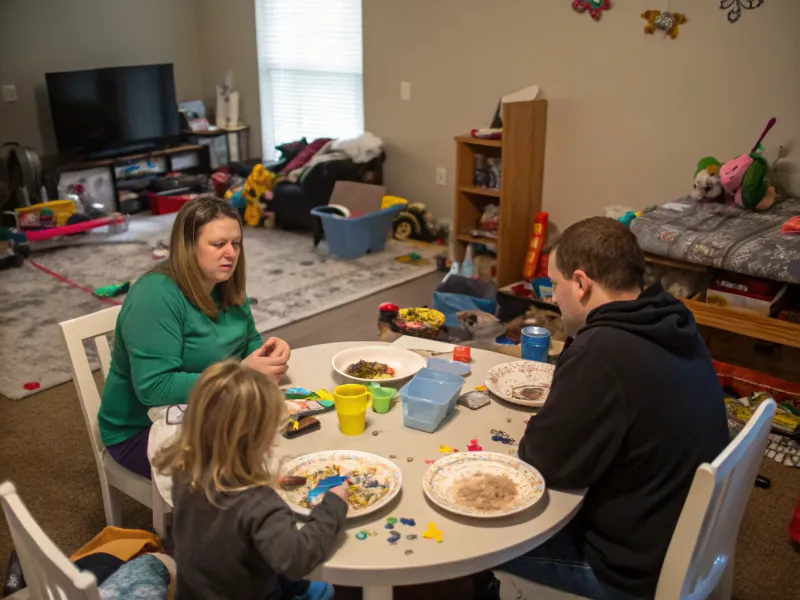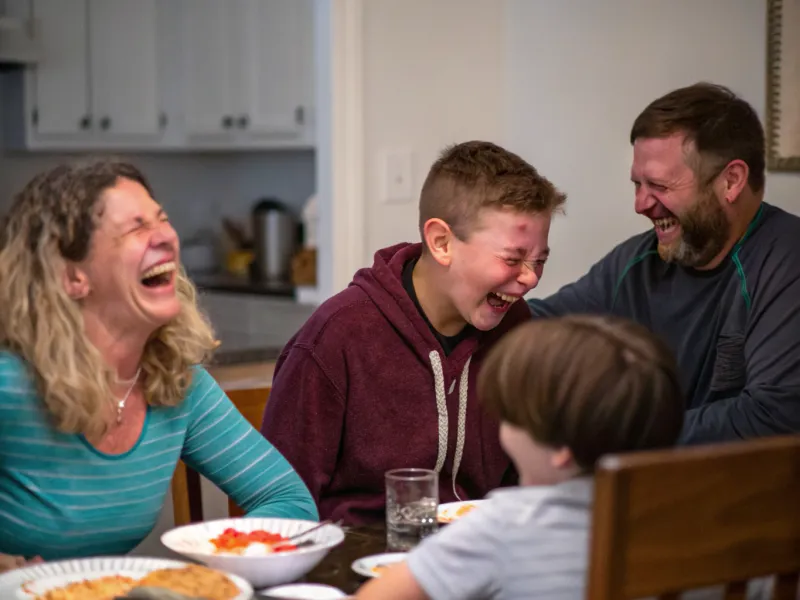33 Signs You Grew Up in a Dysfunctional Family (And Never Noticed)

Growing up, you probably thought your family was just like any other. But as years pass, you start noticing quirks that make you question if things were ever “normal.” Let’s take a lighthearted, yet revealing look at 33 signs that might suggest you were part of a dysfunctional family, even if you never knew it. Get ready for a rollercoaster of emotions with each point that may hit close to home.
1. The Silent Treatment as a Weapon

Ever sat through a dinner that felt colder than Antarctica? If your family mastered the art of the silent treatment, you might have grown up in a dysfunctional environment. The silent treatment was wielded like a weapon, turning every meal into a guessing game of “Who did what wrong?” Communication was less a dialogue, more a monologue of eerie silence.
You might’ve thought this was normal until you realized other families actually talked – about their day, their feelings, and even the weather. But in your house, silence spoke louder than words and often, it was deafening. If you’ve ever had a friend over and felt embarrassed by the lack of conversation, then yes, this sign’s for you.
Breaking this cycle means learning to communicate openly, embracing the awkward pauses, and filling them with genuine dialogue instead. It might feel strange at first, like talking to aliens, but trust me, it’s worth it. It’s time to unlearn the silent treatment and replace it with open-hearted chats.
2. Walking on Eggshells

Did you ever feel like you were in a minefield, careful where you stepped and what you said? Constantly worrying about triggering an outburst is a classic sign of dysfunction. Walking on eggshells wasn’t just an expression in your household; it was a survival tactic.
Every sound and word was calculated for minimal impact. You learned to gauge moods before making even the simplest requests, like asking for a sleepover or help with homework. The predictability of unpredictability was exhausting, and sometimes you found yourself holding your breath without realizing it.
Breaking free from this pattern involves recognizing your own right to express without fear. It’s liberating to find spaces where you can speak your mind without anticipating repercussions. Slowly, you can rewire the instinct to tiptoe and replace it with confident strides, knowing you deserve to be heard and not just seen.
3. The Family’s Unofficial Spokesperson

Were you the go-to mediator, the unofficial spokesperson for your clan? Playing the role of a diplomat, you were always smoothing over tensions, explaining one family member’s behavior to another. This unofficial job title is a strong indicator of dysfunction at home.
With every argument, you found yourself in the middle, playing referee, trying to keep the peace. While this might’ve honed your negotiation skills, it also thrust you into roles beyond your years. You learned to shoulder burdens that weren’t yours, often at the expense of your own feelings and needs.
To unlearn this habit, start recognizing your boundaries and prioritizing your emotions. You don’t always have to be the peacemaker or the explainer. It’s okay to step back and let others face their own problems, while you focus on what truly matters to you.
4. Unpredictable Rules

Did the rules in your house change as often as the weather? If so, you likely experienced the chaos of unpredictable rules, a common trait in dysfunctional families. One day, eating in the living room was fine; the next, it was a cardinal sin.
This inconsistency left you forever guessing what was acceptable. It taught you to be hyper-vigilant, scanning for mood shifts that might indicate a new rule in play. You became an expert in adaptability, constantly adjusting to the whims of authority.
Reclaiming stability means setting consistent, clear boundaries for yourself. It involves understanding that rules should be fair and predictable, not tools for control. Embrace environments where expectations are steady, allowing you to breathe easy, knowing exactly where you stand.
5. Secrets, Secrets, and More Secrets

Was your family’s mantra “What happens here, stays here”? Secrets can bind a family in dysfunction, wrapping them in a cloak of silence. If whispering and closed-door conversations were the norm, you might have unknowingly been part of a secret-keeping culture.
These whispered conversations taught you to withhold the truth, presenting a façade to the outside world. You became a skilled secret keeper, balancing the narratives that suited different family members. This culture of secrecy made honesty feel dangerous, leaving you always wondering what was safe to share.
Healing means embracing transparency and recognizing that honesty fosters trust, not betrayal. It’s about breaking the chains of secrecy and finding solace in being open. You might find it unsettling at first, but embracing truth is the first step to genuine connections.
6. Emotional Outbursts Were the Norm

Did your family have a flair for the dramatic, where emotional outbursts were a regular feature? These explosions of emotion might have dictated the household’s atmosphere, keeping everyone on high alert.
In such environments, you learned to manage your own emotions by suppressing them, afraid that expressing how you truly felt might fuel the fire. The unpredictability of these outbursts taught you to be a master of emotional restraint, often at the cost of your own well-being.
Recognizing this pattern is the first step towards change. Allow yourself to feel without fear, and find healthy outlets for those emotions. Whether it’s therapy, art, or a trusted friend, discover spaces where emotional expression is not just allowed, but welcomed.
7. Nonexistent Personal Boundaries

Did privacy seem like a foreign concept in your home? If there were no clear boundaries, you might have grown up thinking it was normal for everyone to know everyone else’s business, all the time.
Doors were left open, conversations interrupted, and personal space was practically a myth. This lack of boundaries taught you to accept intrusions as normal, leaving little room for individual growth and self-discovery.
Building personal boundaries is a journey of self-respect and self-care. Start asserting your need for privacy and space, however uncomfortable it might feel at first. As you establish these boundaries, you’ll find a newfound sense of freedom and empowerment.
8. Codependency Was Encouraged

Were you taught that needing help from someone outside the family was a betrayal? If your family thrived on codependency, you might have grown up believing that loyalty meant never branching out.
Every decision, every emotion felt intertwined with the family’s collective psyche. Venturing out was seen as a lack of commitment, making it difficult to establish your own identity. This unspoken rule kept you tethered, often sacrificing your own independence for the sake of family unity.
To break free, start nurturing your own identity separate from those around you. It’s about cultivating relationships where interdependence replaces codependency, allowing for mutual support without losing oneself. Remember, it’s okay to lean on others, but also to stand firmly on your own.
9. Financial Instability as a Constant

Was money always a tense subject in your home? Financial instability might have been a constant background noise, impacting every decision and conversation.
You grew up aware of the weight of every dollar spent, feeling the stress of financial insecurity. This awareness often translated into anxiety around money in your adult life, making financial stability seem like an elusive dream.
To find peace, it’s important to develop a healthy relationship with money. Educate yourself on financial literacy, and set realistic financial goals. Remember, your worth isn’t tied to your bank balance, and building stability is a journey, not a destination.
10. Parental Roles Were Reversed

Did you find yourself parenting your parents? When parental roles reverse, the child becomes the caregiver, often sacrificing their own childhood to meet adult responsibilities.
This dynamic forced you to mature quickly, juggling school with household duties and emotional support roles. While it might have taught you resilience, it also robbed you of a carefree childhood, leaving you grappling with adult issues before your time.
Reclaiming your childhood means allowing yourself to be cared for, even if it feels foreign. It’s okay to seek help and drop the superhero cape now and then. Embrace spaces where you can just be you, without the weight of the world on your shoulders.
11. Perfectionism Was the Norm

Was there an unspoken rule that everything had to be perfect? Perfectionism can be a hallmark of a dysfunctional family, where mistakes were failures instead of learning opportunities.
You were groomed to believe that anything less than perfect was unacceptable, leading to a relentless pursuit of flawlessness. This pressure often left you feeling inadequate and anxious, trapped in a cycle of striving yet never arriving.
To break free from perfectionism, embrace the beauty of imperfection. Celebrate small wins and learn to appreciate the process rather than just the outcome. It’s a journey towards self-acceptance, where you allow yourself the grace to be human and imperfect.
12. Addictions Were Overlooked

Did your family turn a blind eye to addiction? Whether it was alcohol, gambling, or something else, ignoring addiction is a clear sign of dysfunction.
Addictions were the elephants in the room, never addressed directly but always impacting family dynamics. You learned to tiptoe around these issues, developing strategies to cope with the chaos they brought.
Acknowledging these patterns is the first step towards healing. Seek support groups or therapy if needed, and start the conversation that was always hushed. It’s about breaking the cycle and fostering an environment where addiction is recognized and addressed, not ignored.
13. External Validation Was Everything

Did you grow up chasing approval like it was the last cookie in the jar? If external validation was your family’s currency, you might have grown up believing your worth was tied to others’ opinions.
Achievements weren’t celebrated for personal growth but for the accolades they brought. You were programmed to seek approval from everyone else, often losing sight of your own desires and worth.
Rediscovering your self-worth means finding validation from within. Start celebrating your achievements for what they are, not for who they impress. It’s about writing your own story and understanding that you are enough, just as you are.
14. Emotional Support Was Scarce

Did you feel like an emotional island in your family? If emotional support was scarce, you might have grown up feeling isolated, learning to self-soothe from a young age.
The lack of a nurturing emotional environment taught you to bottle up feelings, fearing vulnerability as a weakness. You became self-reliant emotionally, often struggling to ask for help when needed.
Opening up to emotional support means learning to trust and lean on others. It’s about fostering relationships where emotional vulnerability is seen as a strength, not a weakness. Find your tribe, those who let you be you, raw and real.
15. Guilt and Shame as Tools

Were guilt and shame regular tools in your family’s arsenal? If so, you might have grown up with these emotions as constant companions, shaping your decisions and self-view.
Guilt was used to control, making you feel responsible for others’ happiness. Shame kept you in line, making sure you didn’t stray too far from family expectations. These tactics left you questioning your worth and decisions.
To shed these burdens, start recognizing your right to make choices free from guilt and shame. Embrace the liberation that comes from owning your narrative, unapologetically. It’s about rewriting the script, where you are enough just as you are.
16. Criticism Was More Common Than Praise

Did criticism outweigh praise in your household? If so, you might have grown up thinking that nothing was ever good enough, always striving for approval that seemed just out of reach.
Every achievement was met with “Could’ve been better,” leaving you chasing an elusive standard of excellence. This constant criticism shaped your self-esteem, making you your harshest critic.
To break free, start recognizing your accomplishments without the need for external validation. Celebrate your efforts and progress, understanding that you are a work in progress, beautifully imperfect. It’s about finding your voice and silencing the inner critic.
17. Emotional Manipulation Was a Game

Did you feel like a pawn in an emotional chess game? If emotional manipulation was the norm, you might have grown up learning to read moods and anticipate others’ needs at the expense of your own.
The emotional landscape was a minefield, where manipulation was used to control and dictate dynamics. You became adept at placating and pleasing, often feeling responsible for others’ emotions.
Breaking this pattern involves understanding your right to emotional autonomy. It’s about setting boundaries and recognizing manipulation for what it is. Embrace relationships where mutual respect and honesty are the foundations, not games.
18. Denial Was a Family Trait

Was denial part of your family fabric? Pretending problems didn’t exist was an art form, honed over years of practice. This denial meant issues were never addressed, always swept under the rug.
It taught you to ignore the obvious, hoping problems would magically disappear. You became skilled at pretending everything was fine, even when it wasn’t, a survival tactic that can follow you into adulthood.
Acknowledging reality is the first step towards change. It’s about facing issues head-on, no matter how uncomfortable. Embrace honesty and transparency, fostering an environment where truth is a friend, not a foe.
19. Comparison Was the Default Setting

Was comparison your family’s favorite pastime? If so, you might have grown up feeling like you were never enough, always compared to others in the relentless pursuit of perfection.
Achievements were always measured against someone else’s, leaving you feeling inadequate. This comparison culture taught you to undermine your own successes, focusing on what you lacked instead of what you achieved.
Breaking free involves celebrating your uniqueness and understanding that you are incomparable. Embrace your qualities, knowing that you are not a copy but an original. It’s about finding joy in your journey, not someone else’s.
20. Conflict Was Avoided At All Costs

Was your family conflict-averse, sweeping tensions under the rug in the name of peace? Avoiding conflict often means avoiding growth, leaving issues unresolved and festering.
You learned to swallow your feelings, fearing that speaking up might rock the boat. This avoidance taught you to value superficial harmony over genuine connection, often feeling isolated despite being surrounded by family.
Facing conflict means learning to express your needs without fear of repercussions. It’s about embracing honest conversations, where differences are seen as opportunities for understanding, not division. Find strength in your voice, knowing it deserves to be heard.
21. Apologies Were Rare

Were apologies as rare as unicorns in your household? If so, you might have grown up believing that admitting wrong was a weakness, not a strength.
Mistakes were glossed over, never acknowledged, leaving unresolved tensions in their wake. This refusal to apologize meant conflicts lingered, often resurfacing in unexpected ways.
Recognizing the power of a sincere apology is transformative. It’s about taking responsibility for your actions and understanding that vulnerability is not a flaw, but a bridge to healing. Embrace the freedom that comes with humility and forgiveness.
22. Family Loyalty Was a Double-edged Sword

Did family loyalty come with strings attached? If so, you might have grown up feeling torn between honoring family expectations and pursuing your own path.
Loyalty was a badge of honor, but it often came at the cost of individuality. This pressure to conform shaped your choices, making it difficult to distinguish between family obligations and personal desires.
Balancing loyalty with individuality is key. Embrace your unique path, knowing that being true to yourself doesn’t negate your love for family. It’s about finding harmony between who you are and where you come from, honoring both without losing yourself.
23. Emotional Expression Was Discouraged

Were emotions packed away like winter clothes in your house? If expressing feelings was frowned upon, you might have grown up suppressing your emotional side, learning to hide tears and smiles alike.
This discouragement taught you to bottle up emotions, fearing judgment or ridicule. You became skilled at presenting a composed exterior, even when turmoil brewed within.
Allowing emotional expression means embracing vulnerability as a strength. It’s about finding spaces where you can be your authentic self, emotions and all. Discover the freedom that comes with feeling deeply and expressing openly, without fear.
24. Unspoken Rules Governed Household

Did unspoken rules dictate your home life? From where you sat at dinner to who spoke when, these invisible guidelines often governed household dynamics.
It taught you to anticipate expectations without them being voiced, leaving little room for spontaneity. This constant adherence to invisible rules shaped your behavior, often making you second-guess your actions.
Breaking free from unspoken rules involves embracing open communication. It’s about questioning norms and understanding that rules should be clear and fair. Foster environments where transparency reigns, and creativity flourishes without constraint.
25. Emotional Needs Were Overlooked

Were emotional needs relegated to the back burner in your family? If so, you might have grown up feeling unseen and unheard, with your emotional well-being often overlooked.
You learned to self-soothe, finding solace in music, books, or solitude. This neglect taught you to downplay your emotions, prioritizing others’ needs over your own.
Recognizing your emotional needs is vital for healing. It’s about discovering what truly makes you happy and fulfilled, without guilt. Cultivate relationships where mutual support is the norm, and your emotions are valued and respected.
26. Family Roles Were Rigid

Were family roles set in stone, with each member assigned a specific part to play? If these roles were rigid, you might have felt trapped, unable to explore your own identity beyond the family’s script.
Roles dictated behavior, leaving little room for change or growth. Whether you were the responsible one or the troublemaker, stepping outside these roles was often met with resistance.
Embracing flexibility means redefining your role within the family and beyond. It’s about breaking free from labels and exploring who you are, beyond the confines of predefined expectations. Allow yourself the freedom to evolve and change.
27. Blame Was Passed Around Like a Hot Potato

Was blame a familiar game in your household? If it was tossed around like a hot potato, you might have grown up in an environment where accountability was scarce.
Mistakes were never owned, always deflected, creating a culture of blame rather than responsibility. This dynamic taught you to shield yourself, often fearing the fallout of others’ actions.
Taking responsibility for your actions is empowering. It’s about owning your mistakes and understanding that accountability is a path to growth, not punishment. Embrace the freedom that comes with honesty and integrity in your actions.
28. Emotional Support Was Conditional

Did love feel like a transaction in your family? If emotional support was conditional, you might have grown up believing that love had strings attached.
Affection was granted based on performance, leaving you striving for approval to earn love. This conditional support taught you to equate worth with achievement, often sacrificing authenticity for acceptance.
Understanding that love is unconditional is liberating. It’s about embracing relationships where you are valued for who you are, not what you do. Discover the joy of authentic connections, where love is given freely and abundantly.
29. Criticism Was Disguised as Humor

Did jokes often come with a sting in your family? If criticism was disguised as humor, you might have grown up in an environment where laughter masked hurtful remarks.
Teasing was a common language, often crossing the line from playful to painful. This dynamic taught you to laugh off hurt, hiding the sting behind a forced smile.
Recognizing the difference between humor and hurt is crucial. It’s about setting boundaries and fostering an environment where laughter isn’t at someone’s expense. Embrace humor that heals, not harms, and find joy in genuine connections.
30. Parental Approval Was Everything

Was winning parental approval a lifelong quest? If so, you might have grown up equating success with their satisfaction, always aiming to meet their expectations.
Every decision was influenced by their potential reaction, often sidelining your own desires. This quest for approval shaped your self-worth, tying it to their validation.
Finding your own path means recognizing that your worth isn’t defined by others’ expectations. It’s about pursuing passions that resonate with you, without seeking external validation. Embrace your individuality, and discover the joy of living life on your terms.
31. Emotional Needs Were Secondary

Were your emotional needs always secondary to others’? If so, you might have grown up putting yourself last, learning to prioritize everyone else’s happiness above your own.
This self-neglect became a default setting, often leaving you feeling depleted and unfulfilled. It taught you to equate self-care with selfishness, a mindset that’s hard to shake.
Reclaiming your emotional needs means recognizing your right to self-care. It’s about nurturing your well-being without guilt, understanding that you deserve happiness too. Discover the balance between caring for others and nurturing yourself fully.
32. Applauding Silence Over Expression

Was silence golden in your family? If being seen but not heard was praised, you might have grown up in an environment that valued silence over expression.
This taught you to hold back, fearing that speaking up might disrupt the status quo. You learned to equate silence with strength, often suppressing your voice in the process.
Finding your voice means embracing the power of expression. It’s about recognizing that your thoughts and feelings are valid, deserving to be heard. Break the silence and discover the joy of authentic expression, where your voice matters.
33. Family Dynamics Were a Tightrope Walk

Was navigating family dynamics like a circus act? If so, you might have grown up balancing on a tightrope, carefully managing relationships to maintain equilibrium.
Every interaction was a balancing act, juggling expectations and emotions. This taught you to be hyper-aware, often sacrificing your own needs to keep the peace.
Embracing authentic connections means letting go of the tightrope. It’s about finding balance within yourself, not just in relation to others. Discover the freedom that comes with genuine relationships, where love isn’t a balancing act but a shared journey.
